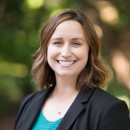Research Office News
Pages
 Katie Edwards Pens Op-Ed for HuffPost on Catastrophic Cuts in NIH Funding
Katie Edwards Pens Op-Ed for HuffPost on Catastrophic Cuts in NIH FundingProfessor Katie Edwards wrote a heartfelt op-ed for HuffPost on the effects of the Trump Administration's cuts to NIH funding. Edward’s research lab has lost six such grants in the last several weeks. “There is so much goodness, love and care that goes into our work — work that is making homes, schools and communities safe for people across the U.S., perhaps even for you and/or someone you care about — and if it is ended, the effects will be calamitous.”
- May 2, 2025
- Learn more »
 Meghan Harrington Receives 2025 U-M Research Study Coordinator Award
Meghan Harrington Receives 2025 U-M Research Study Coordinator AwardResearch Area Specialist Intermediate Meghan Harrington has received a 2025 Research Study Coordinator Award from U-M’s Office of the Vice President for Research. This award honors staff members for important contributions to the university’s research mission through exceptional performance, and by going beyond the ordinary fulfillment of position duties. Harrington will receive the award at a reception in May.
- April 9, 2025
 Katie Edwards Quoted in The Atlantic on NIH Funding Cuts
Katie Edwards Quoted in The Atlantic on NIH Funding CutsProfessor Katie Edwards spoke with The Atlantic about the termination of hundreds of research awards made by the NIH. She said that grinding these trials to a screeching halt is “completely reckless.”
- April 3, 2025
- Learn more »

 Kathryn Maguire-Jack and Sunggeun (Ethan) Park Named 2025 SSWR Fellows
Kathryn Maguire-Jack and Sunggeun (Ethan) Park Named 2025 SSWR FellowsAssociate Professor Kathryn Maguire-Jack and Assistant Professor Sunggeun (Ethan) Park have been named Society for Social Work and Research (SSWR) 2025 Fellows. SSWR Fellows are members who have served with distinction to advance the mission of the Society — to advance, disseminate and translate research that addresses issues of social work practice and policy and promotes a diverse, equitable and just society.
- January 31, 2025
- Learn more »
 Shawna Lee Receives a 2025 SSWR Excellence in Research Award
Shawna Lee Receives a 2025 SSWR Excellence in Research AwardProfessor Shawna Lee has received a Society for Social Work and Research (SSWR) Excellence in Research Award as a co-author on the paper, "Family stress processes underlying material hardship and parental detachment and warmth amongst racially diverse fathers and mothers with low income" in the Journal of Family Violence.
- January 31, 2025
- Learn more »
 Andrew Grogan-Kaylor’s Research Cited in MSN News
Andrew Grogan-Kaylor’s Research Cited in MSN NewsProfessor Andrew Grogan-Kaylor’s research was cited in an article in MSN News on the detrimental effects physical punishment can have on children’s mental health. Grogan-Kaylor’s research found that kids who are spanked more often are more likely to defy their parents and experience an increase in anti-social behavior. They are also at an increased risk for developing aggression, mental health problems and cognitive difficulties.
- January 10, 2025
- Learn more »

 Anao Zhang and Rachel Brandon Receive Children’s Cancer Research Fund Grant
Anao Zhang and Rachel Brandon Receive Children’s Cancer Research Fund GrantAssociate Professor Anao Zhang and PhD student Rachel Brandon are part of a team that recently received a grant from the Children's Cancer Research Fund. Their project evaluates the virtual delivery of a strength-based psychological treatment to young adults with cancer.
“We are excited to receive this grant and conduct a pilot clinical trial at Michigan Medicine's Adolescent and Young Adult Oncology Program,” said Zhang. “It is also very exciting to involve Rachel Brandon, a joint social work and psychological doctoral student, as a study co-investigator and project coordinator to further boost the implementation of the trial.”
- October 23, 2024
 Shawna Lee’s Research Cited in Tech Explorist
Shawna Lee’s Research Cited in Tech ExploristProfessor Shawna Lee’s research on how fathers are connecting with their children — despite economic hardship and negative stereotypes — has been cited in an article on Tech Explorist. Lee and her co-authors call for these positive experiences to be reflected in the media and for health care providers to support father-inclusive practices.
- October 4, 2024
- Learn more »
 Anao Zhang Quoted in Everyday Health
Anao Zhang Quoted in Everyday HealthAssociate Professor Anao Zhang's article "The efficacy of cognitive behavioral therapy for mental health and quality of life among individuals diagnosed with cancer: A systematic review and meta-analysis," was published in Cancer Medicine and featured in Everyday Health. Zhang says the findings confirm that cognitive behavioral therapy can help many people cope with the negative feelings that come up while living with cancer.
- September 3, 2024
- Learn more »
 Rogério M. Pinto Is Featured on the Academic Minute
Rogério M. Pinto Is Featured on the Academic MinuteProfessor Rogério M. Pinto was featured on Academic Minute, a daily radio segment showcasing academic research on WAMC/Northeast Public Radio. In the segment, Pinto explores how artwork can help white heterosexual men to confront feelings of homophobia and sexism.
- August 8, 2024
- Learn more »